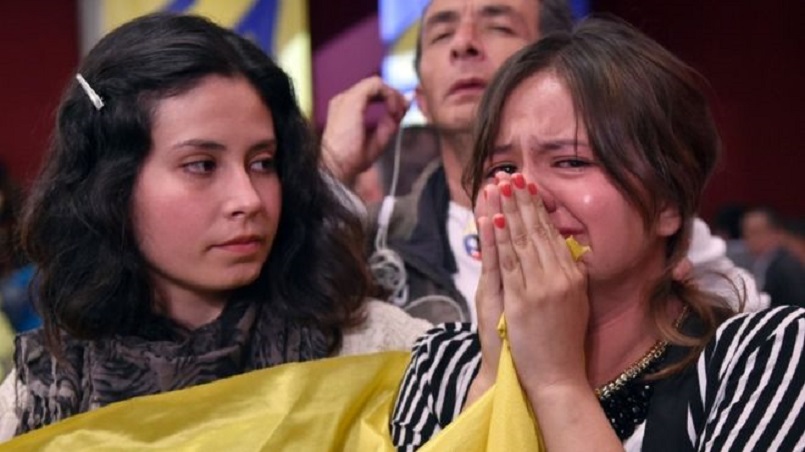
Voters in Colombia have rejected a landmark peace deal with Farc rebels in a shock referendum result, with 50.24% voting against it.
The deal was signed last week by President Juan Manuel Santos and Farc leader Timoleon Jimenez after nearly four years of negotiations.
But it needed to be ratified by Colombians in order to come into force.
Addressing the nation, President Santos said he accepted the result but would continue working to achieve peace.
He said the current ceasefire remained in place and that he had ordered negotiators to travel to Cuba to consult Farc leaders on the next move.
"I won't give up," he said. "I'll continue the search for peace until the last moment of my mandate because that's the way to leave a better country to our children."
Meanwhile the Farc leader, known as Timochenko, said the group remained committed to securing an end to the war.
The rebels earlier agreed to lay down their weapons after 52 years of conflict to join the political process.
But critics said the deal treated the Farc, which the US still considers a terrorist group, too leniently.
With votes in from more than 99% of polling stations counted, 50.2% opposed the accord while 49.8% supported it - a difference of less than 63,000 votes out of 13 million ballots. Turnout was low at less than 40%.
The surprise result means the peace process is now shrouded by uncertainty.
Former Vice-President Francisco Santos, who opposed the deal, said he hoped a better agreement would follow.
"The "no" victory is a victory for peace with justice, it is a victory for a peace with pardon and reconciliation. The triumph of the "no" is the triumph of a more inclusive peace, peace which includes us all, a more stable peace," he said.
President Santos had previously warned that there was no plan B for ending the war, which has killed 260,000 people.
The result is a major setback to the president, who since his election in 2010 had pledged to end a conflict blamed for displacing about eight million people.
Less than a week ago, he was celebrating with world leaders and Farc commanders the end of Latin America's last and longest-running armed conflict at a ceremony in the historic city of Cartagena.
The rebels were making plans to lay down their weapons and become a political party within six months.
But the president is now facing one of the most difficult moments in Colombia's recent history, says the BBC's Americas Editor Leonardo Rocha.
If he sticks to his word about there being no plan B, the bilateral ceasefire will be lifted and the war will resume, our correspondent says.
